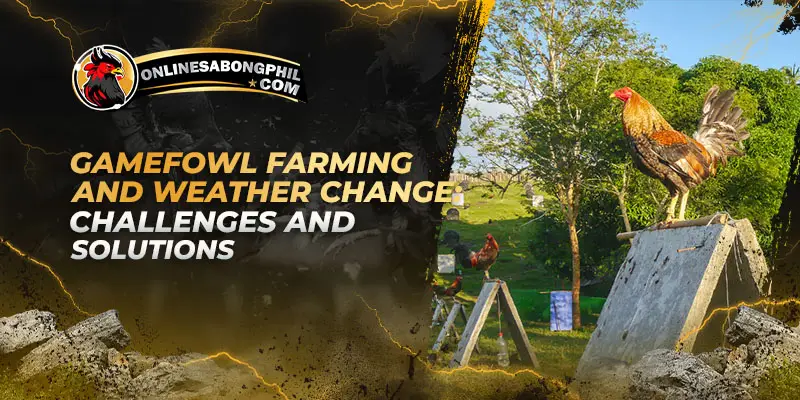Gamefowl farming, which includes chickens kept for cockfighting or exhibition, is a long-established practice. However, the industry is facing an increasing challenge: climate change. Rising temperatures, unpredictable rainfall patterns, and severe storms can have a considerable impact on bird health, breeding cycles, and farm output.
The article looks at both sustainable gamefowl farming practices and climate change adaptation strategies.
Building a Resilient Flock
The first step to weathering any storm, be it weather or competition, is having a strong foundation. Here’s how to build a resilient flock that can thrive in your climate:
Breed Selection
Climate Champions: Not all chickens are created equal! Just like humans, some breeds prefer lounging by the pool (heat-tolerant), while others enjoy winter sports (cold-hardy). Research breeds known to be tough in your climate. For instance, if you live in a scorching zone, consider breeds like the Asil or Kelantan, famous for their ability to handle the heat. On the other hand, if you experience harsh winters, breeds like the Malay or Cornish might be a better fit with their natural winter coats. To ensure your roosters reach peak fighting condition, consider consulting resources on how to develop a strong fighting rooster.
Proper Housing
Fresh Air Flow is King: Imagine a stuffy gym – not exactly ideal for a workout, right? The same goes for chickens. Well-ventilated coops with good air circulation are crucial. This lets hot air escape during scorching summers and prevents moisture build-up in chilly winters. Think of it as your birds having built-in air conditioning and dehumidifiers!
Sun Smart Shelters
Just like us, chickens need protection from the sun’s harsh rays. Consider shade structures for their outdoor runs during hot days. These can be simple tarpaulin coverings or planted trees that provide natural shade. On the flip side, for colder periods, insulated shelters become essential. Think of them as cozy winter cabins for your feathered friends.
Food Fit for Every Season
- Summer Snacking: When the temperature soars, your birds need to stay hydrated and cool. Provide electrolytes in their water to replenish essential minerals lost through sweating. Also, make sure they have consistent access to fresh, clean water. On exceptionally hot days, you might even consider putting ice cubes in their waterers.
- Winter Feasts: As the temperature dips, your birds need to work harder to stay warm. Adjust their feed to include more protein and fats. This extra energy boost is like giving them internal furnaces to keep them toasty. Consider supplementing their diets with specialized game fowl supplements and rooster feeds to ensure they have the optimal nutrition for the season. Of course, fresh, clean water remains a must throughout the year.
Adapting to the Elements for better Gamefowl Farming
Mother Nature can be unpredictable, and keeping your birds safe from extreme weather is crucial. Here’s how to be a weather warrior for your flock:
Beating the Heat
- Temperature Tantrums: Keep a close eye on the thermometer! During heatwaves, when temperatures climb and tempers might flare (both yours and the birds’), take action.
- Shade Seekers: Imagine a flock of chickens huddled under a tiny umbrella – not very effective, right? Provide ample shade in their outdoor runs. This can be anything from shade cloth coverings to planting trees for natural shade. Think of it as creating a cool, green oasis for your birds.
- Misting Marvels: Just like a refreshing mist on a hot day feels good for you, misting systems can be a lifesaver for your birds. A gentle misting helps cool them down and keeps them comfortable.
- Cool and Collected Water: Water is essential for survival, especially during scorching summers. Ensure your birds have constant access to fresh, cool water. On extremely hot days, you can even add ice cubes to their waterers.
- Early Bird Gets the Feast: Chickens are most active during the cooler mornings. By scheduling their feeding earlier in the day, they’ll be less likely to be out and about during the hottest part of the afternoon.
Conquering the Rains and the Chills
Drainage Defenders
Heavy rainfall can turn your chicken paradise into a swamp. Proper drainage is key! Ensure your coops and runs are built on higher ground or have proper drainage systems in place. Regularly clear debris from drainage ditches to prevent waterlogging. This keeps your birds dry and healthy.
Deep Litter Dynasty
Deep litter bedding, like wood shavings or straw, is a multi-tasking marvel. It absorbs excess moisture from rain and droppings, keeping your coop nice and dry. Plus, it provides extra warmth during colder months – a win-win for all seasons!
Draft Dodgers
Drafts are the enemy in winter! Seal any gaps or cracks in your coop to prevent cold air from entering. Think of it as caulking the windows and doors of your own home to keep the heat in.
Bedding Bonanza
Just like you pile on the blankets in winter, provide your birds with extra bedding for warmth. This can be anything from straw to hay – a cozy haven for your feathered friends to snuggle up in.
Nesting Necessities
For egg-laying hens, winter can be a tricky time. Make sure they have plenty of nesting materials like hay or straw to create warm, comfy nests for laying their eggs.
Feeder and Waterer Warriors
Frozen feeders and waterers are no fun for anyone. Invest in properly insulated feeders and waterers. Check them regularly during cold snaps to ensure they remain accessible and prevent your birds from going thirsty or hungry.
Sustainable Practices for a Healthy Planet
Being a responsible gamefowl farmer means looking after not just your birds but also the environment. Here are some sustainable practices you can adopt to be kind to the planet:
Water Wise Ways:
Water is a precious resource and every drop counts. Collect rainwater in barrels or tanks to use for cleaning coops, watering plants that provide shade for your birds, or even topping up their waterers during light rain.
Smart Watering Systems
Ditch the Hose! Automatic watering systems with drip irrigation deliver just the right amount of water directly to your chickens’ needs, avoiding unnecessary waste.
Waste Not, Want Not:
Chicken manure might not smell like roses, but it’s a goldmine for your garden! Compost your chicken manure to create a natural fertilizer rich in nutrients. This homemade fertilizer can be used on your farm to grow healthy plants, reducing your reliance on store-bought options and closing the loop on waste.
Disease Defense:
A clean environment is key to keeping your feathered friends healthy and happy. Regularly disinfect coops and runs using natural cleaning products whenever possible. This helps avoid the transmission of infections that can hurt your birds and necessitate antibiotics.
Quarantine Newcomers
New birds entering your flock can unknowingly carry diseases. Implement a quarantine protocol where new birds are housed separately for a period of time and monitored for any signs of illness before being introduced to the main flock. This simple step can prevent outbreaks and keep your entire flock healthy.
Conclusion
By adopting sustainable management practices and adapting to the changing climate, gamefowl farmers can ensure the well-being of their birds and the long-term viability of their farms. Remember, a healthy environment creates healthy birds. By incorporating these strategies, gamefowl farmers can not only navigate the challenges of climate change but also contribute to a more sustainable future for the industry.
Visit the website: Onlinesabongphil.com



